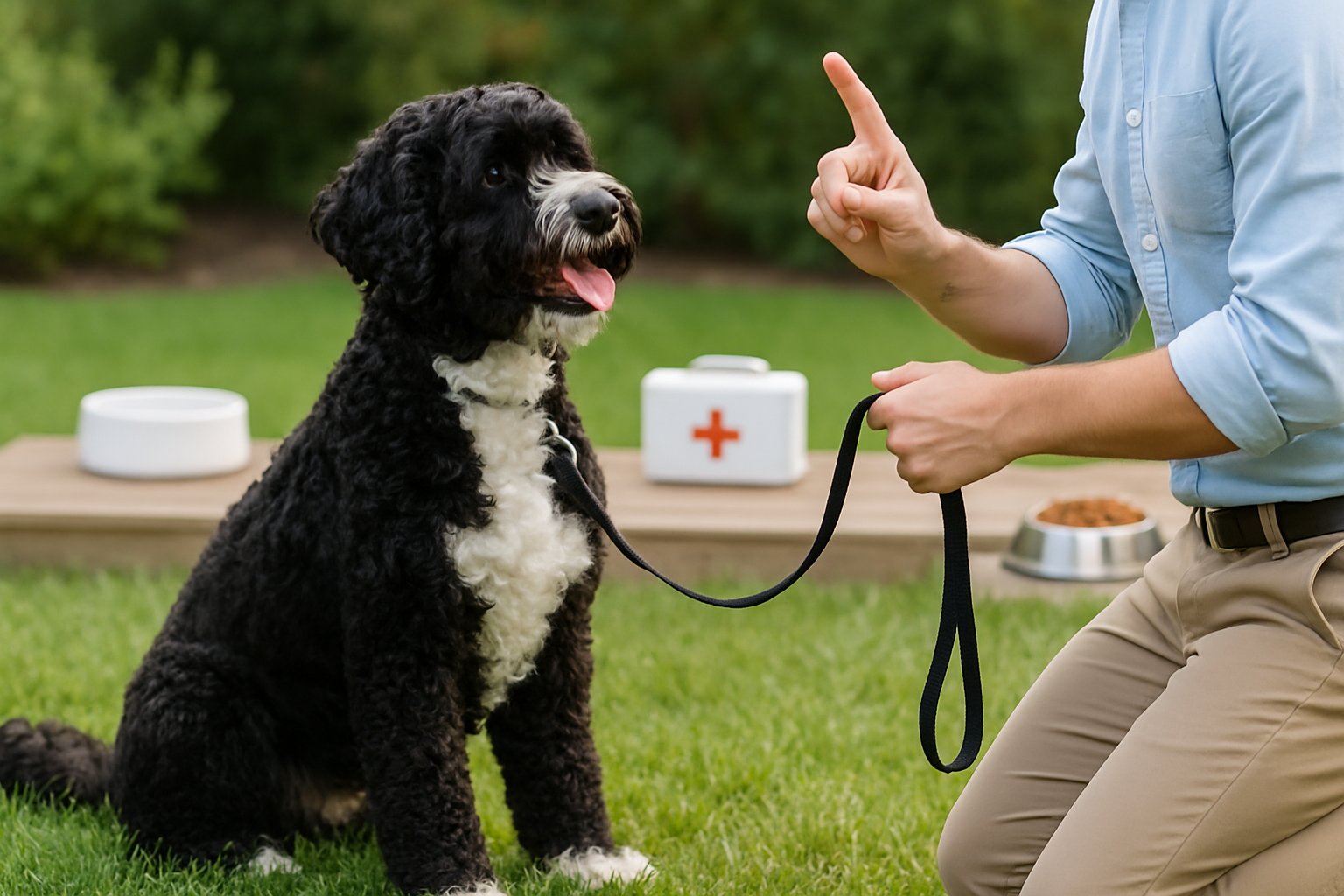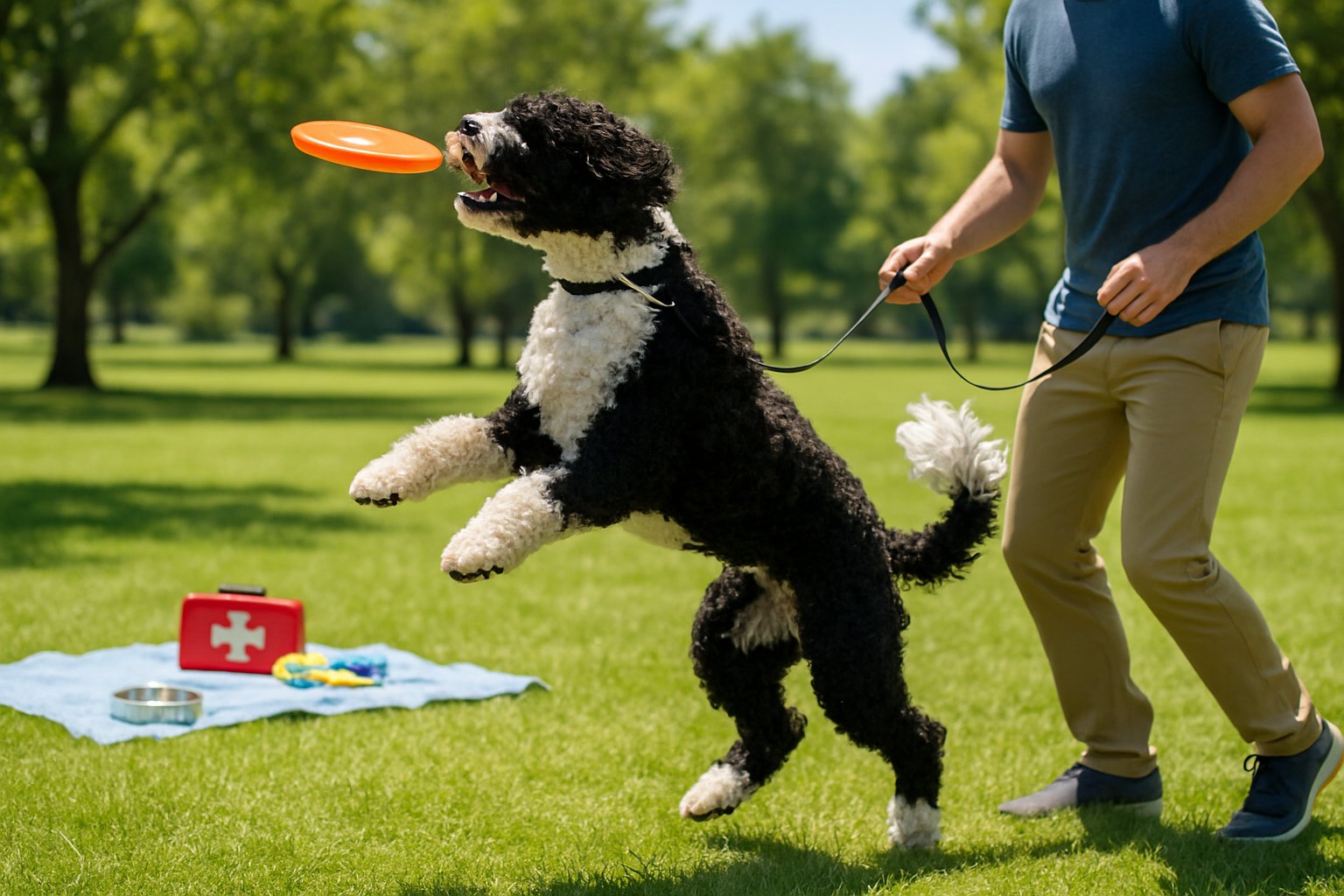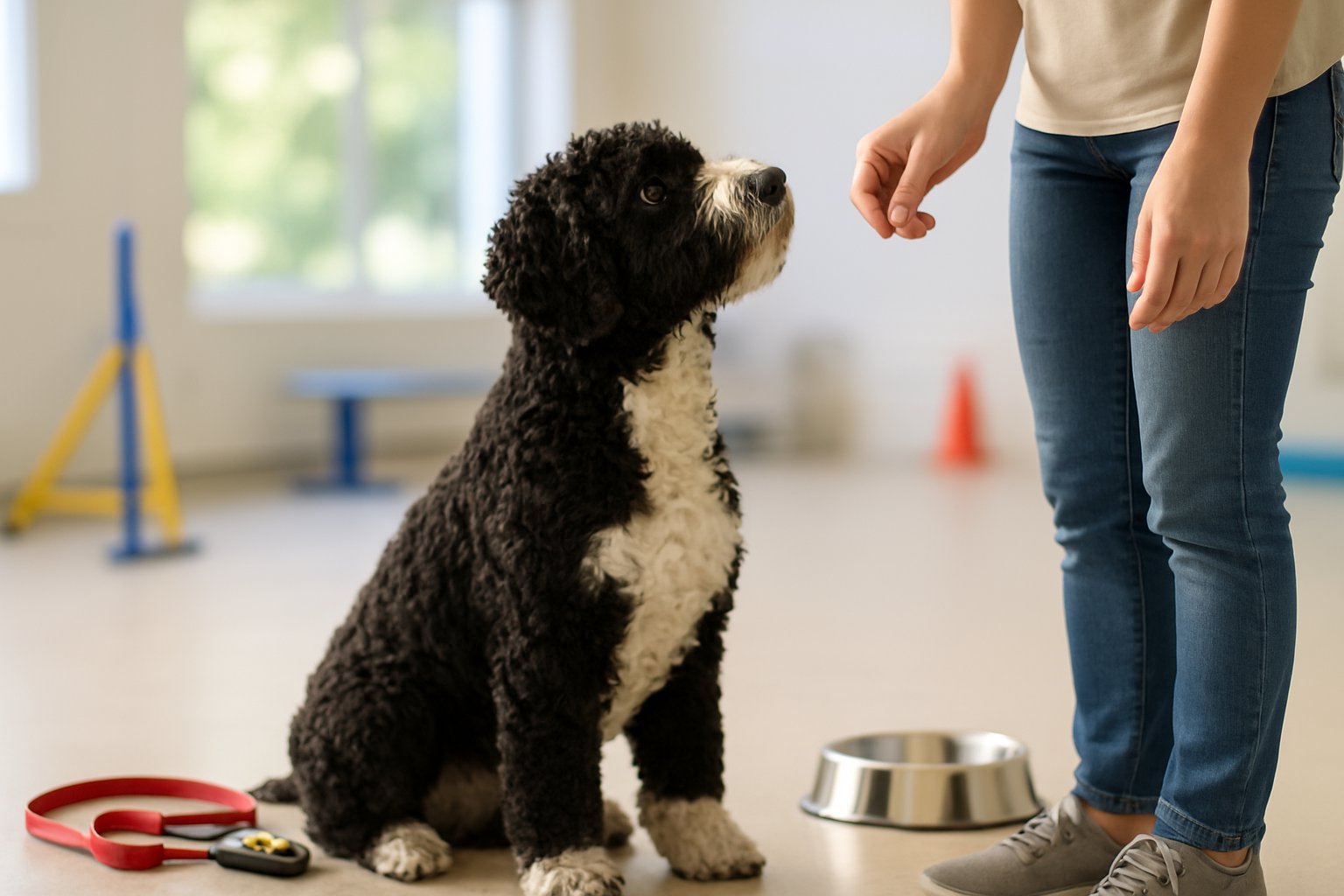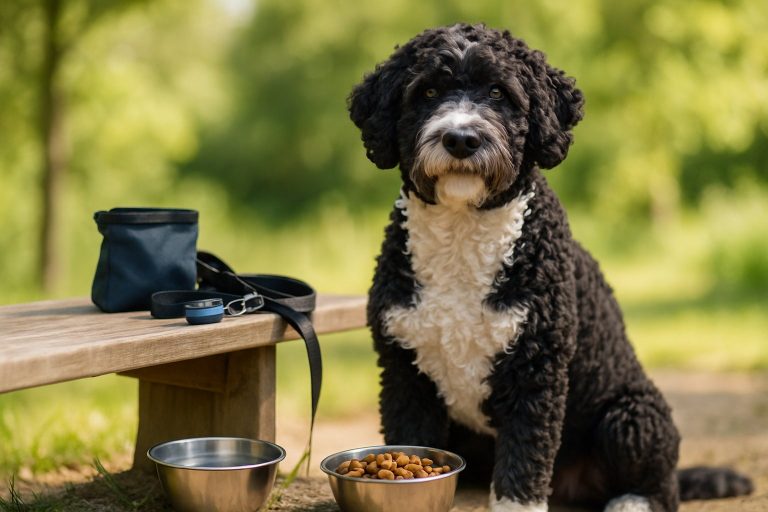Temperament and Personality

Portuguese Water Dogs are known for their friendly demeanor, affectionate nature, and intelligence. These traits make them strong family pets that adapt well to active households and enjoy positive interactions with both people and other animals.
Typical Behavior and Temperament
- Portuguese Water Dogs have an energetic personality. They are playful and thrive in active settings, needing regular exercise and mental challenges. Their temperament is generally friendly and outgoing, but some individuals can be cautious around strangers until they get comfortable.
- You can expect adaptability from this breed. They fit well into homes with children, singles, or couples and usually get along with other pets. Socialization, starting from an early age, is key to shaping their balanced personality.
- Short periods alone are fine for them, but these dogs want to be around their family most of the time. If left alone often, separation anxiety can happen.
Affectionate and Family-Friendly Nature
- You will quickly notice this breed is very affectionate. Portuguese Water Dogs love spending time with their owners and form strong bonds with all members of the family. They are known to be loyal and often follow their people from room to room.
- These dogs tend to be especially gentle with children. Their playful nature helps them interact well with kids, and they show patience in family settings. With the right introduction, they can become comfortable with other pets, making them suitable for multi-pet households.
- Their warm, engaging personality means they aren’t best for a family looking for a guard dog. Instead, they excel as companions and thrive on involvement in daily routines. For more on their family-friendly qualities, see this overview of Portuguese Water Dog’s friendly traits.
Intelligence and Trainability
- Portuguese Water Dogs are highly intelligent, which makes them eager and capable learners. They perform best when you use consistent and positive training methods. Their intelligence also means they may get bored easily, so it helps to introduce new tricks or activities often.
- You can expect a high level of trainability. Obedience commands, agility, and even advanced dog sports are all within their skill set. This breed remembers lessons well and can pick up complex tasks faster than many other breeds.
- Mental stimulation is a must to prevent bad habits. You can use puzzle toys, games, and varied training routines to hold their attention.
Exercise Requirements and Outdoor Activities

Portuguese Water Dogs are highly energetic and do best with an active lifestyle. Meeting their exercise needs is important for both physical health and mental well-being.
Daily Exercise Needs
- Your Portuguese Water Dog needs at least 60 minutes of daily exercise to stay healthy and happy. These dogs are considered highly energetic, and missing regular activity can lead to boredom or behavioral problems.
- A daily schedule can include brisk walks, jogging, or play sessions in the yard. It’s best to plan for moderate-intensity activities, such as fetch or tug-of-war. Try to stick to a consistent routine because Portuguese Water Dogs respond well to structure.
- Younger dogs or puppies may have slightly different needs, often splitting their playtime into several shorter sessions. A mix of training, walking, and playtime gives your dog the physical challenge it craves.
Swimming and Water Sports
- Portuguese Water Dogs love water and are natural swimmers. Give your dog frequent chances to swim, as this is one of the best ways to meet their exercise needs.
- Swimming works out their muscles and joints without being too hard on their body. Lakes, clean ponds, or the beach are great spots, but always make sure conditions are safe. You can also introduce water sports like dock diving or retrieving toys from the water.
- A simple routine could involve tossing floating toys, practicing swimming laps together, or even teaching your dog to help fetch items from the water. Supervision is important whenever your dog is in or near water. Many owners find swimming helps their dog burn off excess energy and stay healthy.
Outdoor Activities for Mental Stimulation
- Portuguese Water Dogs need more than just physical exercise. They are also smart and require daily mental stimulation. Outdoor activities that challenge your dog’s mind help prevent boredom-related behaviors.
- Try interactive games such as hide-and-seek, scent trails, or puzzle toys in the yard. Incorporate training sessions into your daily routine to keep your dog’s mind sharp. Agility courses, either homemade or at a dog park, are fun and mentally challenging.
- You can also teach advanced commands or let your dog help with simple outdoor chores. Changing up the activities from day to day keeps your dog engaged and reduces stress.
Training Fundamentals

Portuguese Water Dogs are smart and eager to learn but need structure and the right training approach. Their high energy calls for patient, regular training using proven methods.
Obedience Training for Beginners
Start obedience training early. Teach basics like sit, stay, come, and leash walking. These commands build respect and help keep your dog safe. Use short, fun training sessions to prevent boredom. Set clear boundaries. Always use the same words for each command. This helps your dog understand what you want. Practice skills in quiet areas first, then move to places with more distractions.
Positive Reinforcement Techniques
Positive reinforcement means rewarding good choices as soon as they happen. Use treats, a favorite toy, or praise to let your dog know what you like. Rewards encourage your dog to repeat good behaviors. Avoid harsh corrections; these can create fear and confusion. Instead, focus on marking the right actions immediately. For example, say “yes” and give a treat when your dog sits on command.
Agility and Advanced Training Methods
- Agility training is perfect for Portuguese Water Dogs. Their athletic bodies and sharp minds thrive with obstacle courses, jumps, and tunnels. Start agility only after basic obedience is strong.
- Agility classes teach advanced control and provide healthy exercise. Use praise and small treats to encourage your dog through new challenges. Training sessions should be upbeat but not overwhelming.
- Try new skills in different places to keep your dog interested. You can take part in competitions or just try backyard agility with simple equipment.
Health and Lifespan
Portuguese Water Dogs usually live over a decade and can stay healthy with attentive care. Regular veterinary visits and awareness of breed-specific health risks are both important for a long, active life.
Average Lifespan and Wellness
- Most Portuguese Water Dogs live about 11 to 13 years. Some dogs can reach or slightly outlive this range with proper diet, exercise, and regular check-ups. Their energy and eagerness make them eager to play well into their senior years.
- Good wellness starts with a balanced diet and plenty of activity. These dogs need daily exercise to stay at a healthy weight and support heart health. Good grooming—including ear care—lowers your dog’s risk for infections.
- If you stay alert for changes in mood, appetite, or physical ability, you can often catch health concerns early.
Genetic Health Issues
- Portuguese Water Dogs are generally healthy, but there are a few genetic health problems seen in the breed. Hip dysplasia is one common issue, where the hip joint does not develop properly and can lead to arthritis or discomfort.
- Other risks include progressive retinal atrophy (PRA), a group of diseases that lead to vision loss, and GM1 gangliosidosis, a rare but severe nervous system disorder. Responsible breeders often test for these and other inherited conditions before breeding their dogs.
- Routine screening for these problems can help your dog get treatment right away if something develops.
Routine Veterinary Check-Ups and Care
Regular veterinary check-ups are important for early detection of common health issues. Puppies should have frequent visits during their first year for vaccinations and health assessments, while adult dogs usually need a yearly vet check.
Common exams include:
- Weight and body check
- Eye and ear inspection
- Heart, lungs, and joints exam
- Vaccination updates
- Routine blood work and stool checks
Vets can also give advice about caring for gums, teeth, and skin. Preventive care helps reduce long-term costs and improves quality of life. Make sure to ask your vet about recommended tests for known breed-specific health concerns.
Common Health Conditions
Portuguese Water Dogs are prone to certain inherited diseases, including joint, vision, hormonal, and metabolic disorders. Understanding these health risks can help you spot warning signs early and work with your veterinarian to keep your dog healthy.
Hip Dysplasia and Orthopedic Concerns
- Hip dysplasia is one of the most common health issues in Portuguese Water Dogs. This problem happens when the hip joint develops poorly, leading to arthritis and pain as your dog ages. You may notice symptoms such as limping, lameness, or difficulty rising after rest.
- Because this condition is hereditary, it’s important to buy dogs from breeders who test for hip problems. Managing your dog’s weight, providing a balanced diet, and giving regular low-impact exercise can help lower the risk of orthopedic issues. In some cases, surgery may be an option if the condition is severe.
- Other orthopedic concerns can include elbow dysplasia and patellar luxation, though these are less common. Early screening and regular checkups are the best ways to catch these issues before they become serious.
Eye Disorders Including Progressive Retinal Atrophy
- Eye problems affect many Portuguese Water Dogs. Progressive retinal atrophy (PRA) is the most serious, causing gradual vision loss in both eyes. PRA leads to night blindness first, moving to total blindness over time.
- You should look out for signs like bumping into objects or hesitation in dark rooms. Early veterinary exams and genetic testing can detect carriers of PRA. Other eye disorders include cataracts and distichiasis, where extra eyelashes can irritate the eyes.
- Regular checkups can help you catch these eye health problems early. Some conditions, like cataracts, may be treatable with surgery, while PRA has no cure but can be managed with a safe, consistent home environment. Eye screening before breeding helps reduce the risk of passing on these diseases.
Addison’s Disease and Storage Disease
- Addison’s disease (hypoadrenocorticism) is a hormonal disorder seen more often in Portuguese Water Dogs than in many other breeds. Dogs with Addison’s disease have trouble making enough cortisol, which helps manage stress and body functions.
- Symptoms may include vomiting, diarrhea, lack of energy, or even sudden collapse. These signs can be vague, so regular bloodwork and close monitoring are important if your dog seems off. If diagnosed, Addison’s can be managed with daily medications and routine vet visits.
- You should also be aware of Storage disease (Juvenile Dilated Cardiomyopathy), a rare but fatal heart condition that can affect puppies. Puppies born with this genetic disorder often die young. Responsible breeders now test for carriers to help prevent this disease in the breed.
Diet and Nutrition
Feeding your Portuguese Water Dog a healthy diet helps keep them strong and active. Good nutrition, quality dog food, and the right feeding schedule greatly affect their energy, growth, and long-term health.
Balanced Diet for Health
- A Portuguese Water Dog needs a diet rich in animal protein, healthy fats, carbohydrates, vitamins, and minerals. Protein supports muscle and repair, while fats provide energy for their playful, active nature. Complex carbs like brown rice give extra fuel without weight gain.
- Omega-3 and Omega-6 fatty acids keep your dog’s skin and coat shiny. Fresh vegetables such as carrots or green beans offer important vitamins and fiber. Water is just as important as food, as proper hydration supports digestion and joint health.
- Look for a diet that meets the breed’s special nutrition needs, with balanced calories and all essential nutrients. Avoid giving too many table scraps or treats with fillers, as this can cause unhealthy weight gain and upset stomach.
Choosing the Right Dog Food
When choosing dog food, you should look for a complete and balanced label from a trusted brand. Most adult Portuguese Water Dogs do best with high-quality kibble or wet food that lists animal protein first, such as chicken or fish. Avoid foods with corn, soy, and artificial colors. Limited ingredient formulas are good if your dog has allergies. Many owners use a mix of dry and wet food, or consider raw diets if recommended by a vet.
Feeding Guidelines by Age and Activity
Puppies need to eat more often to support growth. Feed Portuguese Water Dog puppies three times a day with food designed for growth and development. Adults usually do well with two meals daily, using food for active, medium-sized breeds. Old dogs may need fewer calories but still need protein to protect muscle. After hard exercise, provide a small extra meal or treat to help recover energy. Match portion sizes to your dog’s weight, age, and daily activity.
Use this table for a quick reference:
| Life Stage | Meals Per Day | Key Needs |
|---|---|---|
| Puppy | 3 | Growth formula, extra protein |
| Adult | 2 | Balanced for active dogs |
| Senior | 2 | Fewer calories, joint support |



